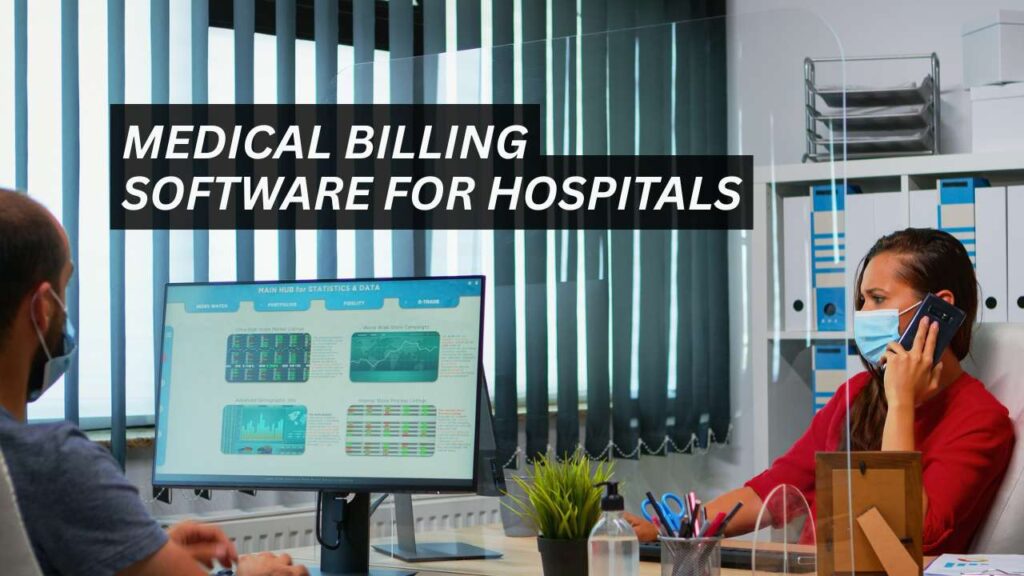Hospital medical billing software has transformed the administration of medical care by unifying its revenue cycle processes and minimizing administrative burdens. In contemporary healthcare centers, Medical Billing Software for Hospitals needs to enable them to manage complicated insurance claims, billing patients, and financial reporting tools. This is a complete hospital medical billing software solution, and it helps to combat the issues that are unique to healthcare providers regarding the current intricate billing landscape.
Whether it is a small clinic or a big hospital network, Medical Billing platform for Hospitals is now a necessity that helps to keep healthcare financially sound and operationally smart. An efficient medical billing software in a hospital can go a long way in ensuring that the cash flow in the hospital is more stable, fewer claims are rejected, and patient satisfaction is higher through proper and on-time billing procedures.
What is Medical Billing Software?
Hospital medical billing is a type of digital program that is made to automate and control the whole billing process in hospitals and healthcare establishments. It is a hospital-based medical billing software that acts as a central hub that does the patient registration, insurance checking, the claim, receiving the payments, and reporting the financial analysis. Medical Billing platforms for Hospitals are easily connected to the electronic health records (EHR) systems in order to record the correct billing and coding information.
Medical billing software that is advanced in hospitals will have inbuilt functions such as automated claim scrubbing, management of denial, and up-to-date verification of eligibility. Medical Billing Software for Hospitals is used by healthcare providers in order to minimize the manual errors involved with the medical billing process, shorten the payment cycle, and keep up with the ever-evolving nature of healthcare regulations. The hospital medical billing software is also intelligent in providing in-depth analytics and reporting features to enable the administrator to make sound financial choices.
Key Features of Medical Billing Software for Hospitals
- Claims Management: Auto-generation of claims, automatic claims submission, and tracking with real-time contract status and denial management features. Claim scrubbing technology is located so that mistakes can be detected and corrected before the claims are submitted retarding the rejection rates and speed of the reimbursement cycles to better cash flow.
- Patient Registration: A full patient registration, insurance coverage, demographic data collection, and management capabilities with eligibility checks. The claims are not denied because of real-time insurance verification, and the automated data capture design ensures a lower number of manual entry errors and enhances the process of registration.
- Coding Integration: Comes with integrated ICD-10, CPT, and HCPCS codes with direct auto-coding suggestions and code compliance. Smart coding assistants allow for avoiding billing errors and providing proper documentation and reimbursement capabilities by selecting the right codes.
- Payment Processing: Support of multiple payment methods such as credit cards, ACH transfer, and payment plans that auto-post. Connected payment gateways enable safe payment, whilst automation of the posting of payment eliminates administrative burden and increases the level of financial reconciliation.
- Reporting and Analytics: Multidimensional financial reporting, KPIs dashboards, and performance indicators to streamline the activities of revenue cycles. Server optimization and Advanced analytics constitute actionable findings into the billing performance of servers, which assists the administrators in finding bottlenecks and opportunities for increasing revenue.
- Integration Capabilities: With ease, it lets you integrate with EHR systems and practice management applications, among other third-party apps. API connectivity facilitates the flow of data on the system and preserves the form and shape of information as well as minimizes duplication in several media.
- Compliance Management: HIPAA compliance capabilities, audit trails, along with regulatory reporting to provide compliance with the healthcare standards. The monitoring of compliance is automated, and regulatory changes are tracked, with comprehensive audit trails, which help document reviews of regulatory compliance and internal quality assurance.
- Denial Management: Tracking of denials, root cause, and workflow of claim resolution are all automated. Intelligent denial categorization and automation of the workflow simplify the process of appeals, and a detailed analytical process allows for detecting trends to avoid arranging a denial.
Benefits of Using Medical Billing Software in Hospitals
- Increasing Cash Flow: Accelerated claims and collection of payments mean a lot to accounts receivable and financial health. The workflow automation speeds up the whole revenue cycle, and real-time tracking of the claims facilitates timely follow-up on outstanding payments and shortens collection periods.
- Minimized Administrative Costs: Automatic processes of repetitive billing needs reduce staffing levels and the cost of running the business. High-end-to-end automation can do away with unnecessary manual effort, and intelligent automation can perform routine tasks, so the staff can work on more valuable tasks and patient attention.
- Improved Accuracy: With computer-based coding and claim scrubbing, human errors are reduced, and the claim scrutinizing rate increases. Validation checks are built-in, so any errors are identified before they are submitted, and processing is standardized so that all departments are using the same billing practices, and there is minimal costly rework.
- Improved Patient Experience: Open billing procedures and options enable patients to better experience and satisfy themselves. Itemized and clear statements and easy payment gateways not only make patients more cognizant of choices but also cover a wide range of payment capacities and lead to enhanced collection percentages.
- Regulatory Compliance: Advanced features have built-in compliance to match the laws of healthcare and minimize rthe isk of auditing. It is possible to record the automated update with new regulations updates as well as documenting thoroughly and having an audit trail to enhance evidence of compliance during the regulatory reviews and in the normal internal reviews.
- Real-time Visibility: Crystal-clear dashboards allow a real-time view of financial data as well as operational indicators. Advanced analytics will provide actionable information about the revenue cycles, and customizable reports can be used in making plans based on dat,a with proactive identification of the problems.
- Scalability: This lets cloud-based solutions easily expand with the increase in patients and network coverage of hospitals. Scalable architecture enables the organization to grow, and flexible infrastructure maintains consistent performance under the occurrence of any increment in the volume of transactions and complexity of systems.
- Data Security: Sensitive data of the patient and financial information is secured using high-level encryption and security. Layered security systems prevent data security attacks, and role-based access limits information access to the users to appropriate levels, with full privacy of the patients safeguarded on the basis of their right otoprivacy.
Top 10 Medical Billing Software for Hospitals in 2025
1. Epic MyChart Billing
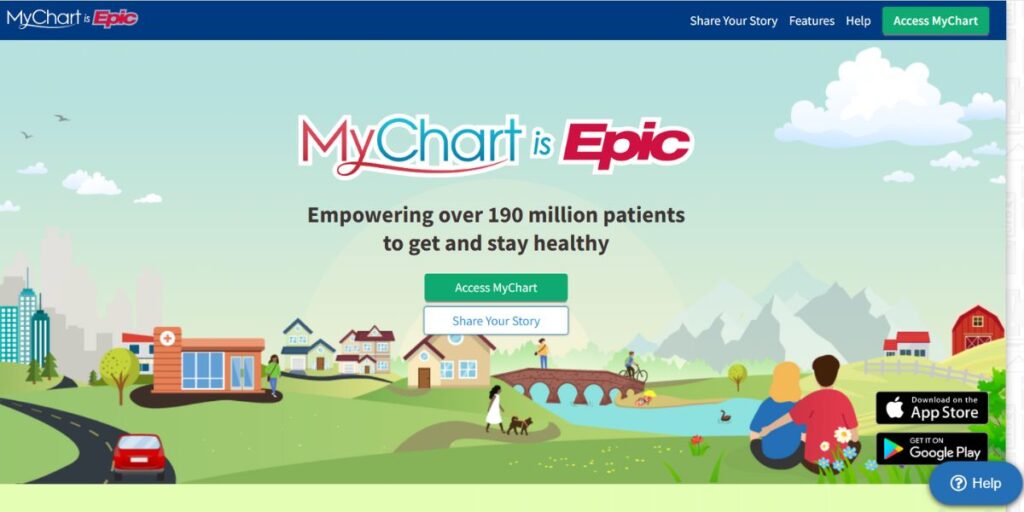
Epic MyChart Billing is a customer product at the peak of enterprise-level medical billing software for hospitals, built with the purpose of large healthcare organization revenue cycle management. The hospital’s medical billing software system is compatible with the EHR system, offered by Epic, to manage the overall data of patients and to improve billing processes.
The uses and benefits of this platform are complex analytics and reporting capabilities that help facilitate revenue cycle optimization of the hospital systems that are compliant with healthcare regulations. Epic Medical billing software for the hospital is the software that helps to manage and run a multi-location facility and difficult billing practices, assisting in hospital systems and large hospital systems with complex financial management software needs.
Type: On-premise and Cloud-based
Ideal For: Large hospitals and health systems
Key Features:
- Integrated EHR and billing system
- Advanced analytics and reporting
- Multi-location support
- Automated workflows
Why It’s Recommended: Best solution in the industry, well-tested in big healthcare institutions.
Website: www.mychart.org
2. Meditech Expanse Billing
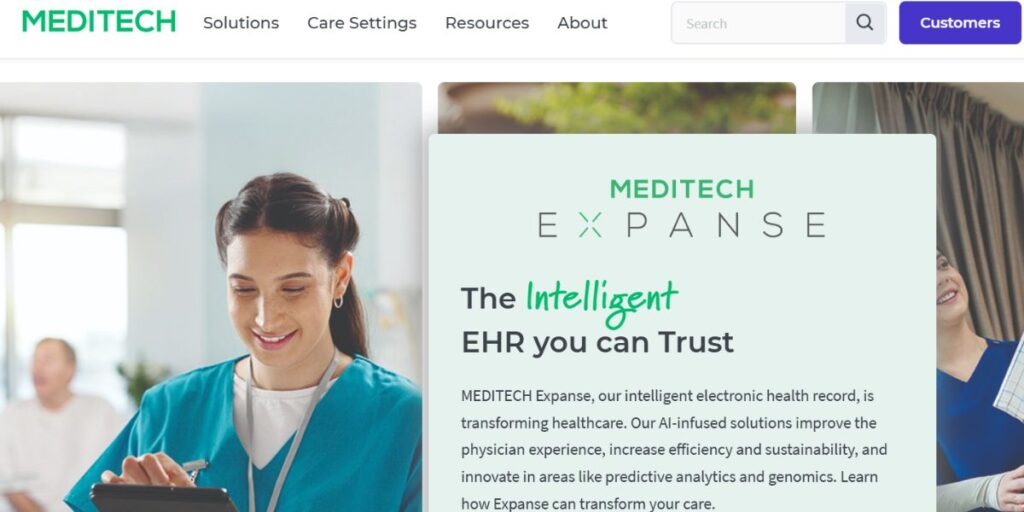
Meditech Expanse Billing is a modern hospital medical billing software that provides state-of-the-art medical billing and medical billing software software and collections management services to medium to large institutions. This is a special type of medical billing software designed especially to integrate with hospitals with an automated claim process that has intelligent denial management functions to ensure maximum reimbursement rates and improved cash flows to the hospitals.
The smooth interaction of the platform with the EHR system of Meditech will facilitate a harmonized healthcare information environment, by virtue of which the efficiency of operations will improve. This medical billing software in the hospital offered by the company allows both a single cloud protected by user ID and password, as well as deployed locally with all the benefits of enterprise-level security. A powerful analytics dashboard and patient engagement tools make the solution the choice of hospitals that want to use a patient-centered solution to automate the billing process and optimize finances.
Type: Cloud-based and On-premise
Ideal For: Medium to large hospitals
Key Features:
- Automated claim processing
- Intelligent denial management
- Integrated EHR connectivity
- Advanced analytics dashboard
- Patient engagement portal
Why It’s Recommended: Good interoperability and experience in the hospital setting.
Website: www.ehr.meditech.com
3. Athenahealth AthenaClinicals
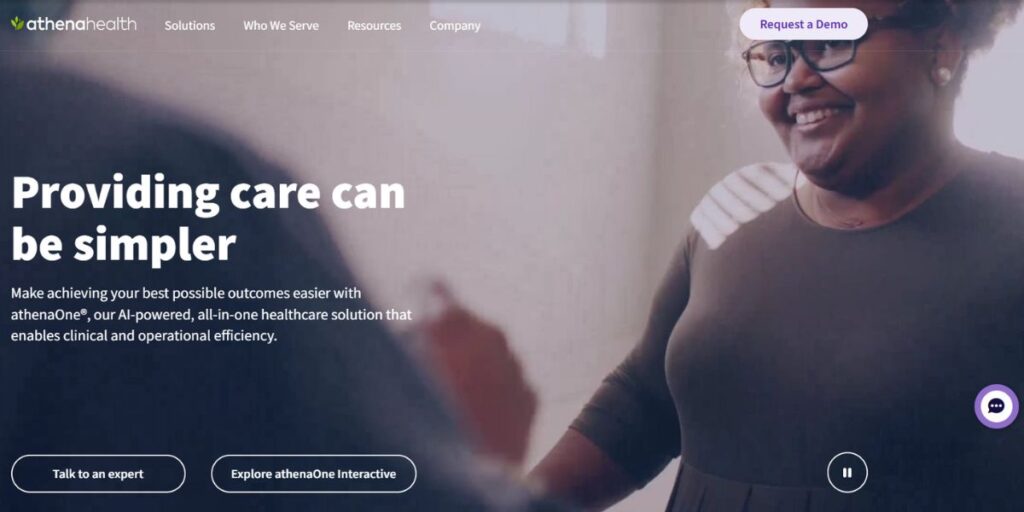
Athenahealth AthenaClinicals is a cloud-hosted hospital medical bills application that targets specifically hospitals’ revenue cycle optimization and performance advancement. This is an innovative hospital medical billing software that has the benefit of automated technology, claim scrubbing, and simultaneous eligibility validation, thereby maximizing reimbursement rates.
The tools developed by the platform to support patient engagement and the capability to perform benchmarking of its performance enable hospitals to enhance financial performance and patient satisfaction levels. Being a tested medical billing software for hospitals tool, athenaClinicals provides an integrated solution to measure results in terms of revenue cycle management. The cloud-based architecture makes it scalable as well as accessible, thus it is more appropriate for the adoption of small to medium-sized hospitals that would like to realize cost-effective billing systems.
Type: Cloud-based
Ideal For: Small to medium hospitals
Key Features:
- Automated claim scrubbing
- Real-time eligibility verification
- Patient engagement tools
- Performance benchmarking
Why It’s Recommended: Great results in revenue cycle management.
Website: www.athenahealth.com
4. NextGen Healthcare
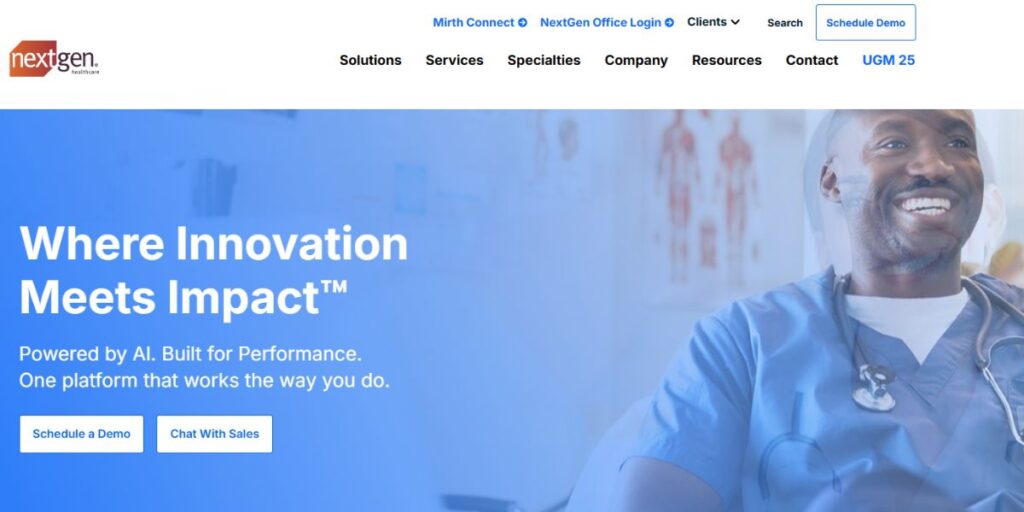
NextGen Health Care offers an extensive medical billing software to hospitals that have directly aligned practice management features that are suited to a multi-specialty healthcare setting. This is a general-purpose hospital medical billing software, which is feasible through a cloud and on-site deployment, so as to adapt to various organizational requirements. The site includes specialty-based templates and powerful reporting analytics that enable hospitals to achieve their best in terms of billing.
Having powerful interconnection properties and working on smartphones, this hospital medical billing software has the ability to integrate with contemporary healthcare processes. Its customization and workflow automation functions suit the placement of the solution in hospitals that need customized billing solutions to expand with the progressive nature of their businesses.
Type: Cloud-based and On-premise
Ideal For: Multi-specialty hospitals
Key Features:
- Specialty-specific templates
- Advanced reporting analytics
- Mobile accessibility
- Interoperability features
Why It’s Recommended: Adaptable solution with a robust customization possibility.
Website: www.nextgen.com
5. AdvancedMD
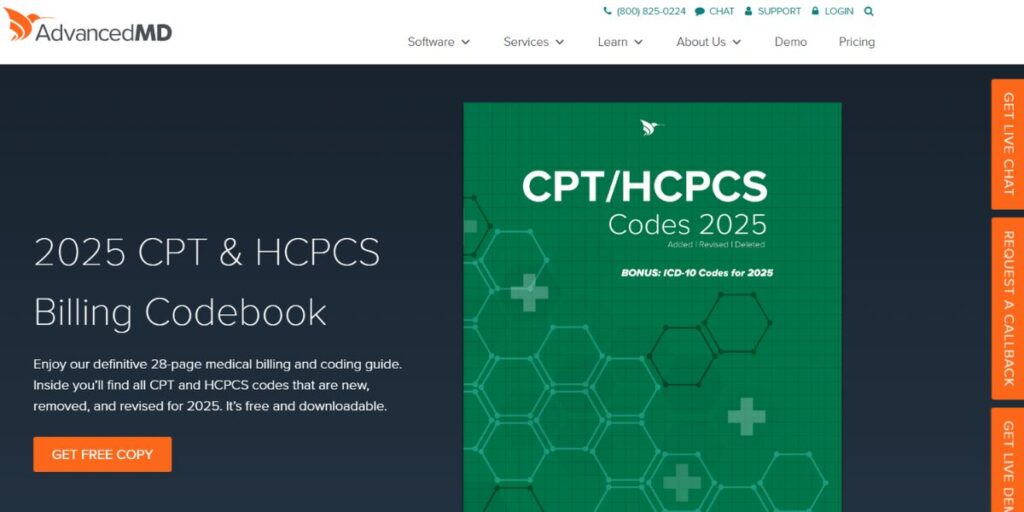
AdvancedMD provides an intuitive medical billing platform to hospitals that has a heavy focus on automation of workflow and operational productivity. This is a cloud medical billing software product whose ease of use is coupled with advanced automation features, hence suitable mostly for small to medium-sized hospitals. Automated patient communication and scheduling provided on the platform simplifies the administrative actions without violating patient privacy terms, as it the HIPAA compliant.
The extensive financial reporting modules of this hospital medical billing software offer an excellent source of information about the performance of the revenue cycles. And having made simplicity and efficiency its key priorities, AdvancedMD can be a helpful option to look at both hospitals that have the need to automate their processes in order to be competitive, and those who want their billing to be efficient without the burden of excessive complexity.
Type: Cloud-based
Ideal For: Small to medium hospitals
Key Features:
- Automated scheduling
- Patient communication tools
- Financial reporting
- HIPAA compliance
Why It’s Recommended: Easy to use, UI with great automation features.
Website: www.advancedmd.com
6. Tebra (formerly Kareo)
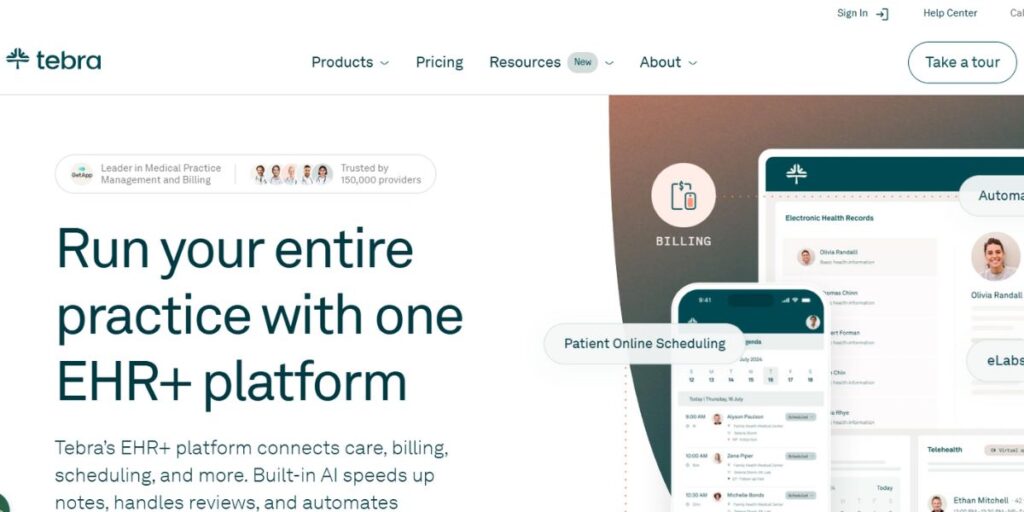
Tebra Billing is medical billing software that has a focus on simplifying hospitals and making the billing procedures efficient. Whether in the hospital, clinic, or workstation at home, this affordable doctor’s medical billing software comes with basic billing features such as easy claim submission, patient billing page, and insurance verification features. This hospital medical billing software is specifically designed to address the needs of small hospitals and clinics, so it addresses the basic billing requirements without any messy complications.
The simplicity of the implementation of the platform and the simple reporting tools available allow it to be implemented at healthcare facilities with small IT resources at their command. Tebra Billing is a low-cost hospital medical billing software solution that delivers outstanding value to organizations that are just looking to make basic billing processes automatic.
Type: Cloud-based
Ideal For: Small hospitals and clinics
Key Features:
- Simple claim submission
- Patient billing portal
- Insurance verification
- Basic reporting tools
Why It’s Recommended: An Inexpensive way and simple to implement.
Website: www.tebra.com
7. DrChrono
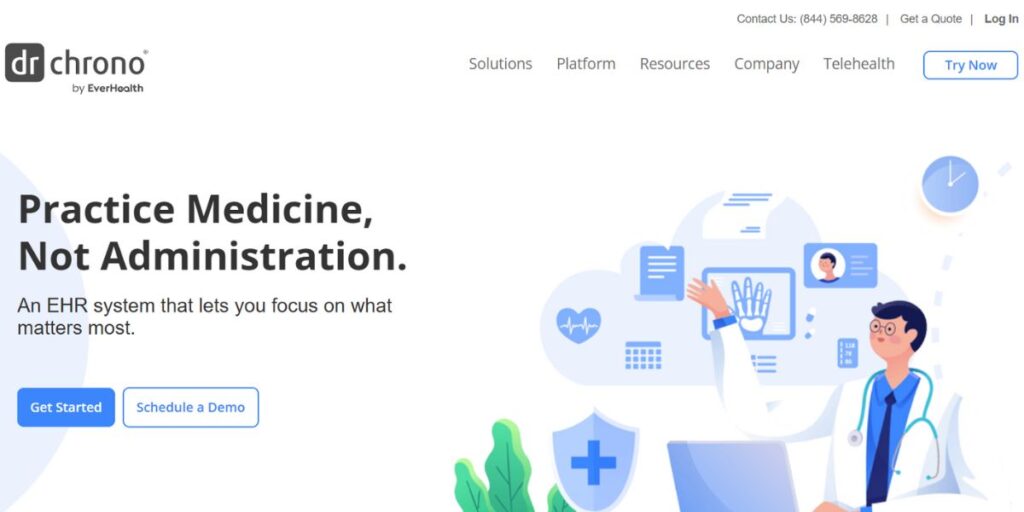
DrChrono provides an iPad-based medical billing hospital solution, and it integrates innovative mobile-based technology with built-in EHR features. This hospital medical billing software is intended to support technology-efficient medical organisations in search of innovative services. The recessed capacity to track claims in real-time and patient check-in practices simple administrative processes and ensures the best user experience on the platform. This medical billing software in hospitals can integrate telemedicine and, therefore, facilitate contemporary healthcare delivery models. DrChrono has a mobile-first attitude and an easy-to-use interface, and can become a good solution to hospitals that have undergone digital transformation of their billing and patient care workflows.
Type: Cloud-based
Ideal For: Tech-savvy hospitals
Key Features:
- iPad-based platform
- Real-time claims tracking
- Patient check-in
- Telemedicine integration
Why It’s Recommended: Creative placement system along with a contemporary user platform.
Website: www.drchrono.com
8. Practice Fusion
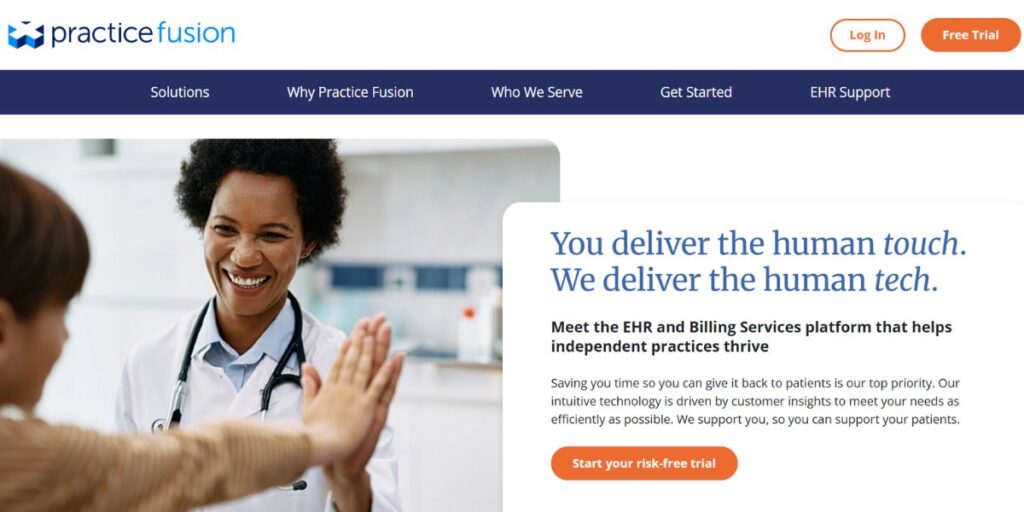
As an option, Practice Fusion provides free medical billing software to hospitals with basic revenue cycle management capabilities, which makes it affordable to small hospitals with modest budgets. It is a medical billing software that is equipped with necessary billing capabilities such as patient scheduling, integration with electronic prescribing, and lab capabilities, which is run through the cloud.
As a software program that provides hospitals with the basic features, it is professional and regulatory compliant at the same time. This will especially make it appealing to small healthcare outlets that may wish to automate their billing systems without having to invest heavily. Nevertheless, although Practice Fusion has a free price, it still offers a stable medical billing software for hospitals functionality that is capable of aiding actual billing activities.
Type: Cloud-based
Ideal For: Small hospitals with limited budgets
Key Features:
- Basic billing functions
- Patient scheduling
- Electronic prescribing
- Lab integration
Why It’s Recommended: It is a free application when simple billing functionality is needed.
Website: www.practicefusion.com
9. CureMD
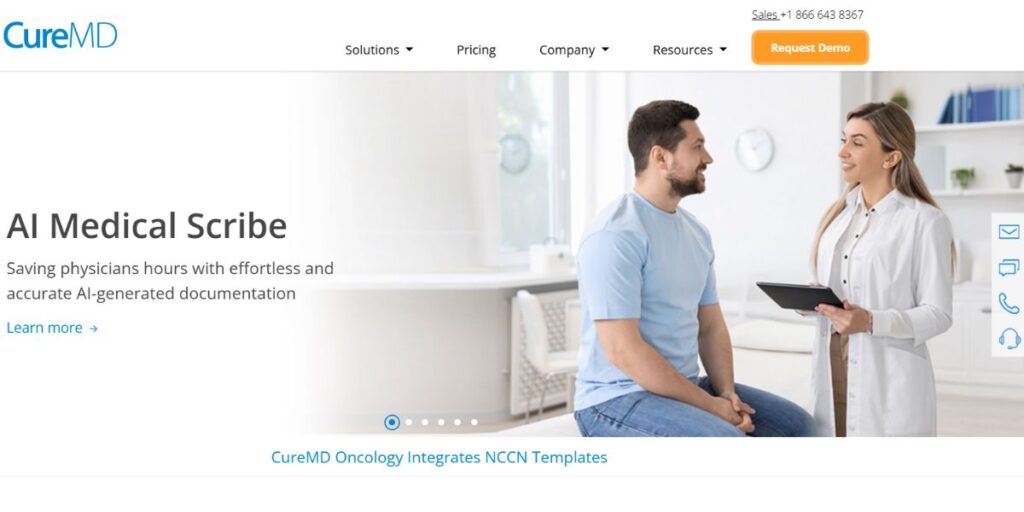
CureMD is the provider of integrated medical billing software to hospitals, which has multi-specialty environment capabilities for comprehensive healthcare management. This powerful hospital medical billing software comes with niche-specific workflow capabilities and superior revenue cycle analytics that maximize the billing process. The tools of patient engagement on the platform and its telehealth functionality help to adhere to contemporary healthcare delivery models.
This medical billing software equipment in hospitals delivers stability through robust client assistance and upgrades, and guarantees adherence to regulations. Remarkably, the solution emphasizes the needs specific to specialties, and this fact makes it especially useful in hospitals that have various medical departments and need special billing workflows and specific reporting options.
Type: Cloud-based
Ideal For: Multi-specialty hospitals
Key Features:
- Specialty-specific workflows
- Revenue cycle analytics
- Patient engagement
- Telehealth capabilities
Why It’s Recommended: Good specialty concentration and great support.
Website: www.curemd.com
10. Greenway Health
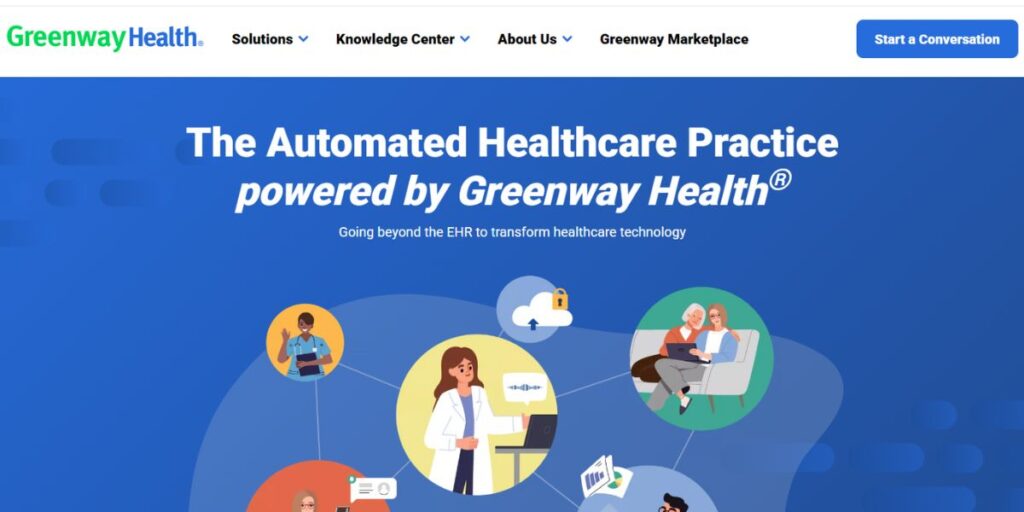
Greenway Health is a provider of medical billing software that is scalable to hospitals and has a high emphasis on interoperability and integration functions. It is a flexible medical billing software designed to be deployed in hospitals with cloud-based as well as on-premise deployment capabilities in order to meet various organizational needs. The PPM and quality reporting functions offered by the platform aid in the value-based care agenda. This medical encoder software has great interoperability standards and care coordination tools that enable a flawless information experience between healthcare systems. Scalability and integration features of the solution suit the fastest expanding hospitals that require Medical Billing Software for Hospitals that grows with them and can perform at a high level.
Type: Cloud-based and On-premise
Ideal For: Growing hospitals
Key Features:
- Interoperability standards
- Population health management
- Quality reporting
- Care coordination tools
Why It’s Recommended: Good Scale and integration.
Website: www.greenwayhealth.com
How to Choose the Right Medical Billing Software for Your Hospital
- Size and Completeness of Hospital: While evaluating medical billing software, hospital size and complexity should be taken into consideration, such as the number of patients, the variety of specialties, and multi-location needs.
- Assess integration needs: Before purchasing the medical billing software, make sure it is capable of integrating well with the current EHR systems and other healthcare technology.
- Alternatives in Deployment: Select cloud-based deployment and on-premise deployment as per the needs of your hospital and IT infrastructure, and security requirements.
- Evaluate Total Cost of Ownership: Include aspects of licensing charges, implementation expenses, training or training expenses, and maintenance expenses in calculating expenditure when buying medical billing software in hospitals.
- Check Vendor Support and Training: Take a look at the level of customer care, training facilities, as well as implementation services provided by medical billing software to hospital providers.
- Investigate Reporting and Analytics: The system should use strong reporting tools that offer actionable intelligence on the performance of revenue cycles and financial performance.
- Test Compliance and Security: Make sure that the medical billing software suits the needs of your hospital in terms of compliance with the HIPAA regulations and contains security measures required to protect patient data.
- Demo and Reference Requests: Check the software capabilities and talk with the current customers to learn more about how the software works in actual practice and how satisfactory it is.
Common Challenges in Hospital Billing and How Software Solves Them
- High Claim Denial Rates: Medical billing software used in hospitals has automatic claim scrubbing and validation options that enable the removal of mistakes in the claims before their creation, thus greatly minimizing denial rates.
- Complex Insurance Verification: A Sophisticated medical billing system in a hospital offers real-time eligibility verification, checking of benefits, eliminating the manual verification process, and also complex rejections of claims.
- Coding Errors and Compliance Issues: Built-in coding guidance and compliance checks in a hospital medical billing software can avoid costly coding errors and ensure compliance with regulatory matters.
- Lack of Payment Collection: Invoicing can be a stress-free aspect of medical billing systems in hospitals, as an automated payment service and portal features collect payments quickly and boost cash flow.
- Lack of Financial Visibility: Detailed reports and analytics in hospital medical billing software allow viewing the health and performance of the revenue cycle and the financial status in real-time.
- Manual Administrative Work: The workflow automation feature of medical billing software in hospitals cuts down manual administrative and data entry tasks while providing hospital staff with enough time to take care of patients.
- Patient Billing Confusion: Hospital medical billing software that includes billing statements and patient portal systems allows improvement in patient understanding and satisfaction on matters related to billing.
- Regulatory Compliance Burden: Medical billing software that is built-in with regulatory compliance can automatically update its system as changes are produced by the regulations and keep an audit trail to facilitate reporting on compliance.
Conclusion
Medical Billing Software for Hospitals is an inseparable component of modern healthcare facilities that want to enhance revenue cycle management and optimize their finances. A specific Medical Billing Software can help to revolutionize their billing management through automating tons of tedious tasks, minimizing mistakes, and furnishing companies with the data they need to monitor their financial improvements.
With the ongoing trend of healthcare evolution, it can be said that hospital medical billing software will be more significant in enabling hospitals to sustain financial stability and yet providing quality healthcare to the patients. Investments in full-featured hospital medical billing software not only enhance efficiency related to the process of billing, but they establish the basis of efficient growth and an excellent leading position in the modern healthcare competitive environment.
FAQs
What is the average cost of medical billing software for hospitals?
The prices depend on features, size of the hospital, and deployment model, and range from free, basic solutions 3 to enterprise systems with prices at 50,000+ per year.
How long does it take to implement medical billing software for hospitals?
The basic systems normally need three to six months to put into operation, and complex enterprise solutions need six to 12 months to implement, and this includes training and data transition.
Can medical billing tool for hospitals integrate with existing EHR systems?
The key functions of the most recent Medical Billing Software are API-based integration with common EHR solutions and standard interfaces.
Is cloud-based medical billing software for hospitals secure?
Yes, there are reliable vendors that can give HIPAA-compliant cloud solutions that can be encrypted, access-controlled, and periodic audits of the security provisions to ensure the security of patient data.
What ROI can hospitals expect from medical billing software?
The first year of implementation is associated with a 15-30 percent improvement in collections, less administrative cost, and the speed at which payment is made in hospitals.

